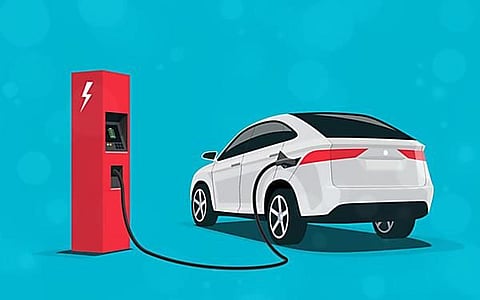
- News Updates
- PSU Watch
- Defence News
- Policy Watch
- हिन्दी न्यूज़
- Jobs Watch
- States News
- Event News

New Delhi: State-run Oil Marketing Companies (OMCs) will set up 22,000 Electric Vehicle (EV) charging stations in prominent cities and on national highways across the country, said the Ministry of Power in a statement on Saturday. Out of 22,000 EV charging stations, 10,000 will be installed by Indian Oil Corporation Ltd (IOC), 7,000 will be installed by Bharat Petroleum Corporation Ltd (BPCL), and the rest 5,000 will be installed by Hindustan Petroleum Corporation Ltd (HPCL), it added. IOCL has already installed 439 EV charging stations and plans to install another 2,000 EV charging stations over the next year. BPCL has installed 52 charging stations, while HPCL has installed 382 charging stations.
The Department of Heavy Industry has recently sanctioned 1,576 nos of public charging stations for 25 highways and expressways which shall be located within every 25 km of range on both sides of these expressways and highways, said the ministry.
The Ministry of Power recently issued the revised consolidated guidelines and standards for EV charging infrastructure on January 14. The government has undertaken multiple initiatives to promote the manufacturing and adoption of electric vehicles in the country. With the considerable expansion in the public EV charging infrastructure, electric vehicles have started penetrating the Indian market.
The government has made 360-degree efforts to enhance public charging infrastructure by involving private and public agencies (BEE, EESL, PGCIL, NTPC, etc). Many private organisations have also come forward to install EV charging stations to develop a convenient charging network grid to gain consumers' confidence. Ministry of Power has planned that charging stations should be in an area of 3×3 km grid. Currently, India has a total of 1,640 operational public EV chargers. Out of which, 9 cities (Surat, Pune, Ahmedabad, Bengaluru, Hyderabad, Delhi, Kolkata, Mumbai, and Chennai) account for approximately 940 stations.
The government has increased its focus initially on nine mega-cities (with population of over 4 million). The aggressive efforts undertaken by the government through various implementing agencies have resulted in rapid growth in deployment of public EVs charging infrastructure. There has been the additional installation of 678 public EV charging stations between October 2021 to January 2022 in these 9 cities, which is about 2.5 times of the earlier numbers, during the same period, about 1.8 lakh new electric vehicles (EV). This has exhibited greater confidence among the consumers to shift towards electric mobility. After the saturation of EV infrastructure in these megacities, the government has plans to expand the coverage to other cities in a phased manner.
The availability of adequate charging infrastructure had been the key impediment for accelerating the adoption of electric vehicles in India. In this regard, the Ministry of Power issued "Charging Infrastructure for Electric Vehicles—Guidelines and Standards," describing the roles and responsibilities of various stakeholders at the Central and State level for the expeditious deployment of public EV charging infrastructure across the country.
Recently, the Ministry of Power revised these guidelines and standards on January 14, 2022, with the following amendments:
(PSU Watch– India's Business News centre that places the spotlight on PSUs, Bureaucracy, Defence and Public Policy is now on Google News. Click here to follow. Also, join PSU Watch Channel in your Telegram. You may also follow us on Twitter here and stay updated.)
